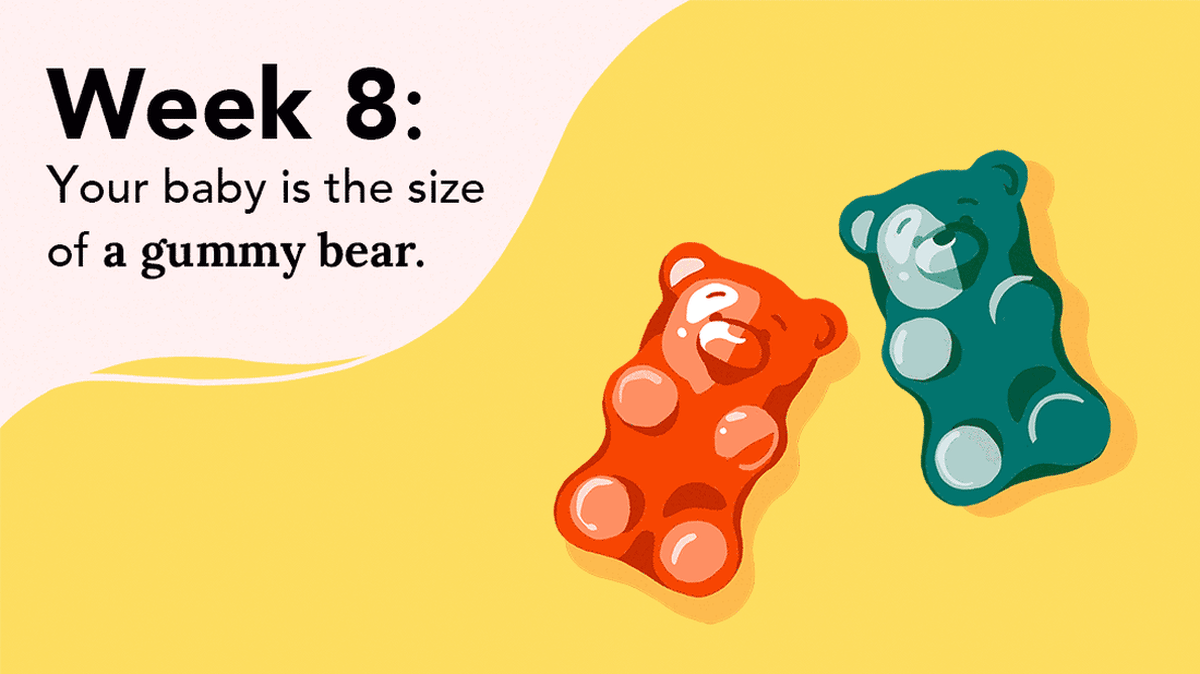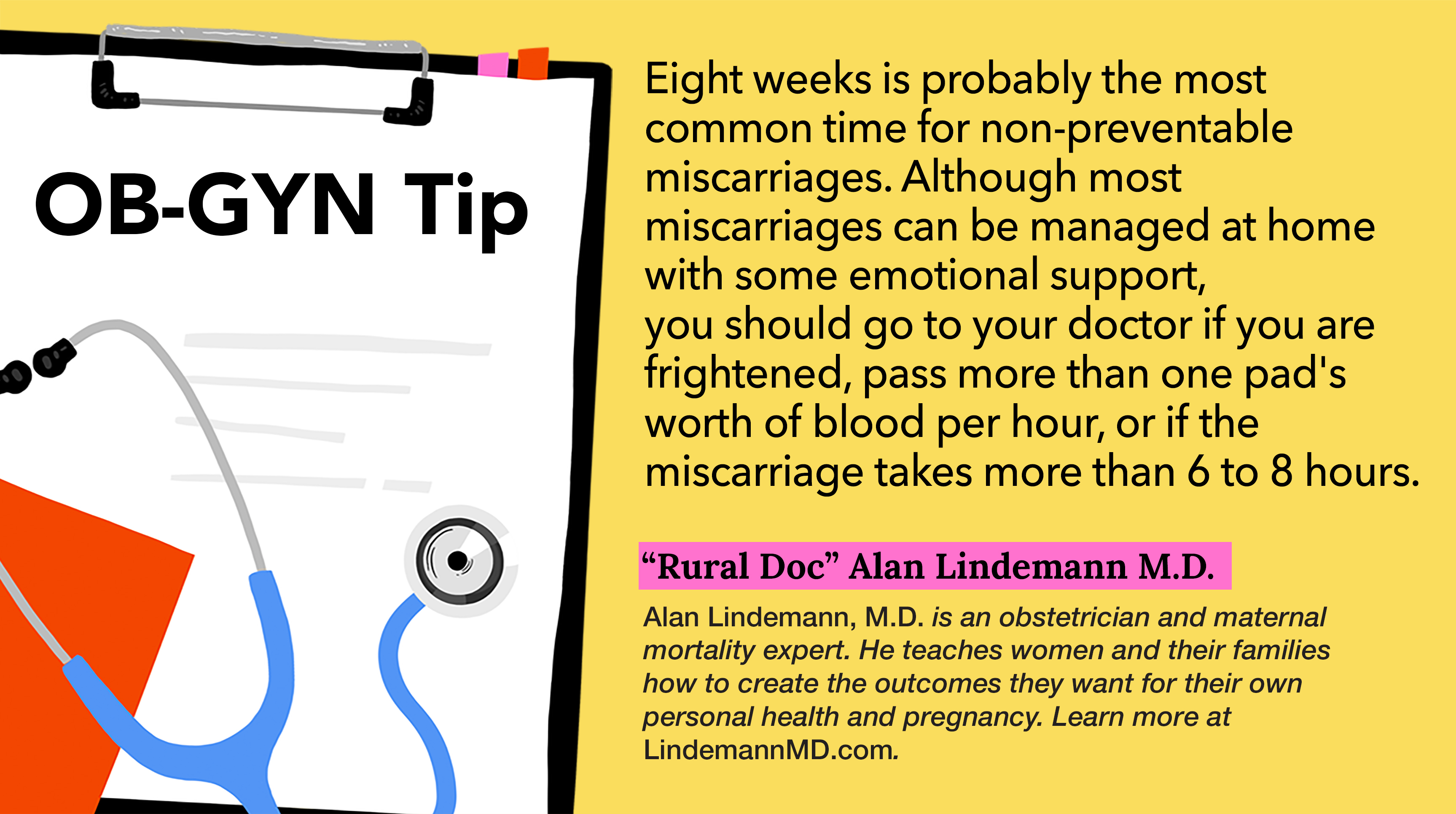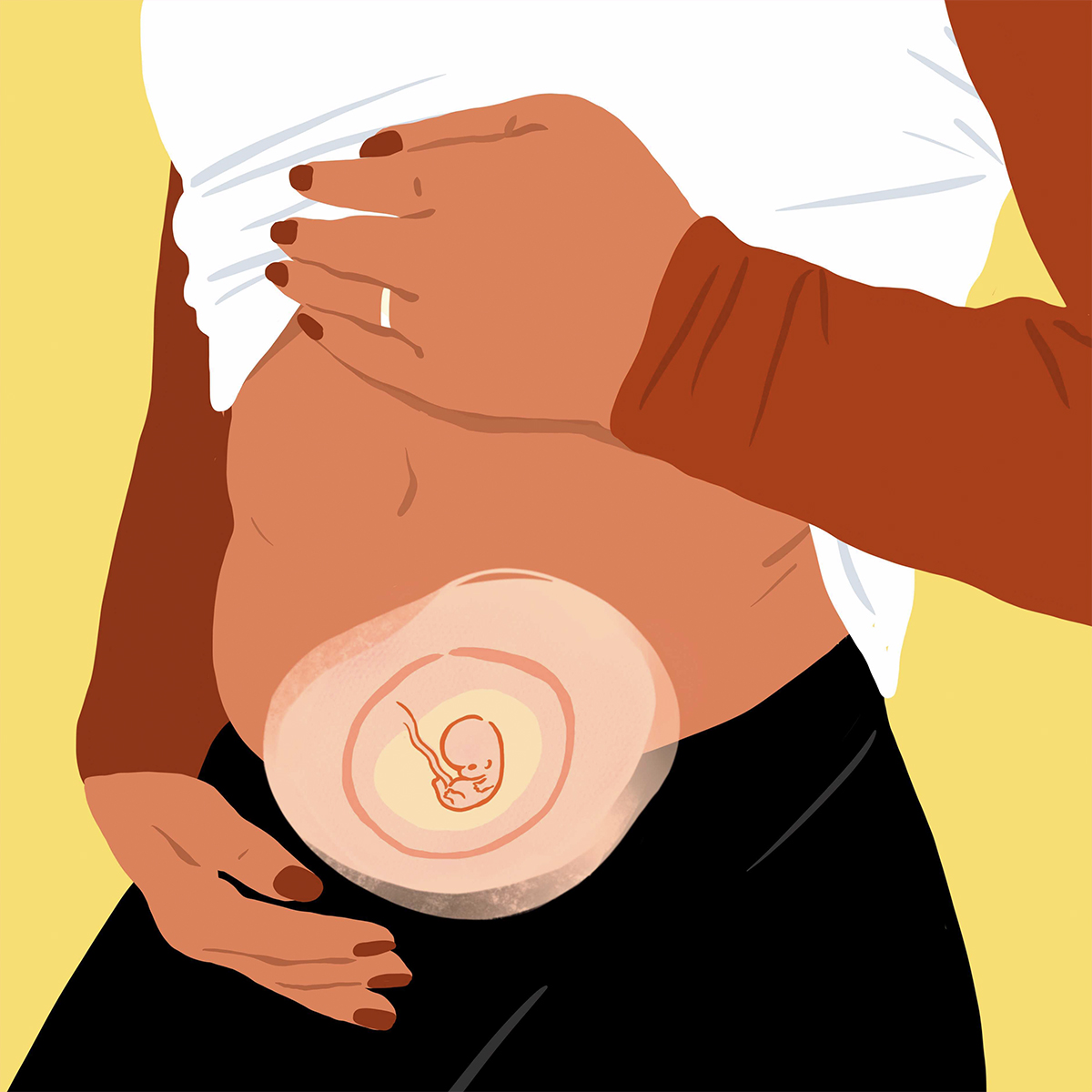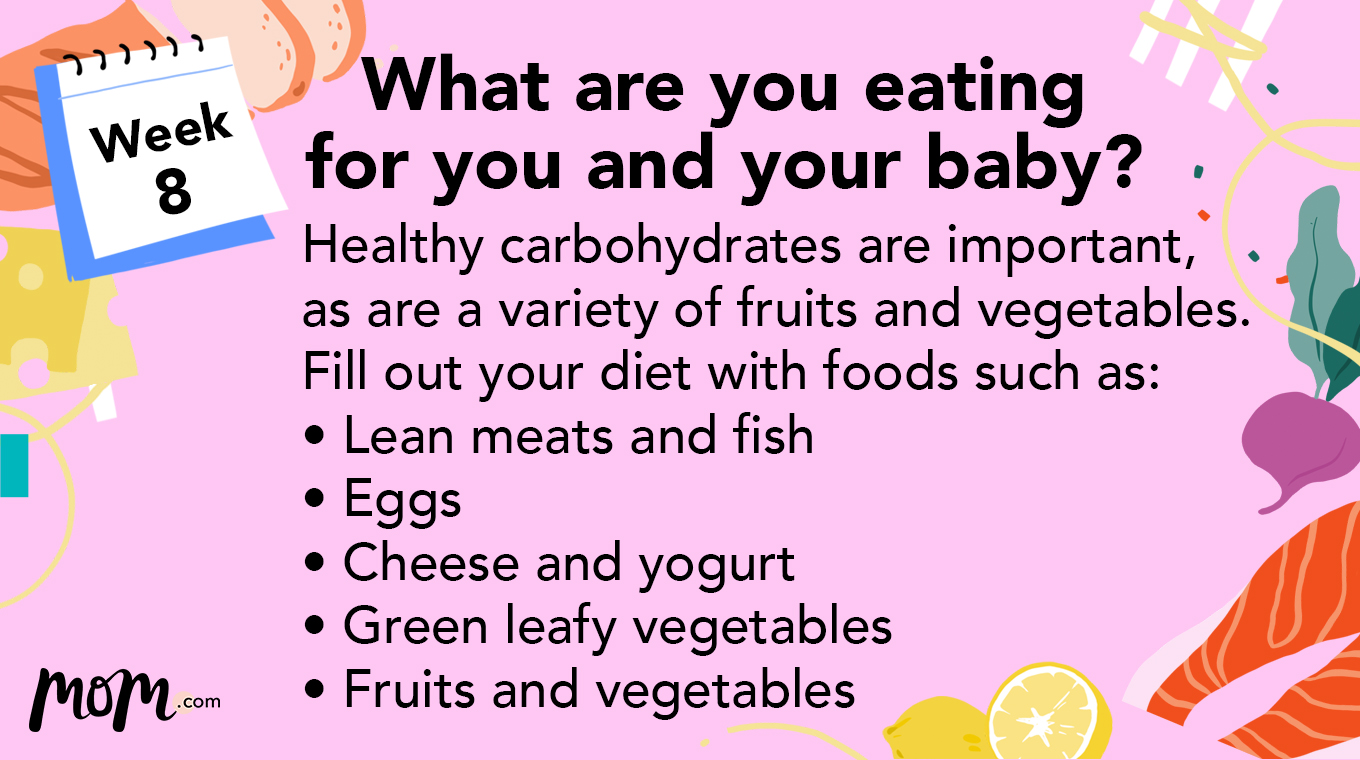
In this article
You’re 8 weeks pregnant!
At 8 weeks you’re in your second month of pregnancy and baby is the size of a gummy bear. Your 8-week pregnancy belly is starting to extend just a bit as your uterus has grown to the size of a grapefruit. Your clothes may begin to feel a bit snug. It may be more comfortable to begin wearing stretchy clothing like leggings. You may not feel ready for maternity pants just yet but, you may want to consider purchasing waistband extenders. These elastic loops hook to your pants buttons and take the pressure off your growing belly. If you’re one of the unfortunate 75% of pregnant women to experience morning sickness, it likely would kick in right about now and can occur any time of day.

Pregnancy symptoms at 8 weeks
Pregnancy symptoms at 8 weeks may mirror those of previous weeks, but with a few extras thrown in for good measure. Hormones seem to be the word of the hour, as much of what you’re experiencing now is a result of increased hormone activity. You may develop an aversion to some foods and smells and start to notice a metallic taste in your mouth. These symptoms are normal.
It’s also possible that you could have no pregnancy symptoms at 8 weeks. By now you should have either met with your obstetrician for your first prenatal appointment or already have one on the books in the near future. Making that first prenatal appointment will set your mind at ease and help you better prepare for the journey that awaits.
Extreme fatigue and nausea
Typically from weeks eight through 12, nausea tends to come on strong and you may start to feel tired throughout the day. Exhaustion and nausea tend to go hand-in-hand, again due to hormones and your body working hard to grow a human.
Food cravings or aversions
Human chorionic gonadotropin (hCG) hormone has increased now and with it comes a variety of food cravings and even food aversions. You may want foods you’ve never had before, or foods you’ve loved for years could send you running to the restroom, hand over mouth, ready to vomit. These ups and downs will eventually taper off sometime around the start of the third trimester, so just know that this, too, shall pass.
Increased vaginal discharge
Another of the uncomfortable pregnancy symptoms at 8 weeks is vaginal discharge. Hormone increase can sometimes cause an increase in milky white vaginal discharge. This discharge, called leukorrhea, is normal and assures you that the vagina is doing what it needs to do to protect your baby from bacteria. It may be helpful and more comfortable to begin wearing a pantyliner during this time if the discharge becomes bothersome.
Pigmented spots on the skin
You may start to notice the skin on your face darkening. Melasma or chloasma occurs most often on the cheeks and chin and is the result of hormones. Women who are pregnant produce an increase in hormones like progesterone and estrogen as well as one called a melanocyte-stimulating hormone (MSH). MSH comes from the pituitary gland and usually increases in the second and third trimesters. The result of this hormone also increases pigments in parts of the skin, most notably on the face.
What does 8 weeks equal in months?
So, what exactly is 8 weeks pregnant in months? At this stage of our pregnancy, you’re two months pregnant. There are approximately seven months left to go before you get to meet your new bundle of joy. Technically, the 40 weeks of pregnancy are 10 months long, but since February is short and some months have 30 days while others have 31, each month truly is about 4.3 weeks long, making a total full-term pregnancy nine months in length.
Your ultrasound
Once your pregnancy is 8 weeks along, an ultrasound may be ordered to measure your baby’s size and the amount of amniotic fluid present. An ultrasound this early in the pregnancy may be done with a transvaginal wand vs. a transabdominal ultrasound over your 8 week pregnancy belly. Your doctor will also be looking to ensure all is well with the placenta, confirm the 8-week-old fetus’ heartbeat, and that the fetus is located where it should be within the uterus.
Your pregnant belly at 8 weeks

Your 8 week pregnancy belly may be undetectable right now. You may have just a slight bump or you may not be showing at all. Your stomach may start to be itchy now or this could happen later as the skin over your belly begins to stretch and grow.
Pregnancy tips at 8 weeks
- If you’re having twins, 8 weeks pregnant is likely when you’d find out. Your early pregnancy would detect two heartbeats vs. one, so your health care provider will help you prepare and let you know what you need to do next.
- You may be feeling constipated more often lately as the hormone relaxin tends to slow down the digestive process. Now is a good time to increase your water intake and start eating more fibrous foods. Constipation coupled with tiredness and exhaustion do not make a good mix, so try to stay active when you can to keep everything moving as it should.
- Continue taking your prenatal vitamins. Talk to your doctor about whether or not you should be taking a folic acid supplement. Folic acid is helpful in preventing neural tube defects of your baby’s spinal cord, spine, and brain.
- A common complaint during week 8 of pregnancy is cramps. If you are experiencing cramping know that it’s normal as your uterus expands. The stretching of muscles and ligaments can cause a cramp feeling that can sometimes be alleviated by staying hydrated or changing the position you’re sitting or lying in. Now would be a great time to buy a pregnancy body pillow to help you redistribute your weight as your belly starts to grow and throws off your center of gravity.
Your pregnancy checklist at 8 weeks
- Now may be a good time to go over with your doctor which types of screening tests you should have. Some will depend on your age, background, and risk factors.
- If you’re working, be mindful of your work environment. Talk with your doctor about any changes you might need to make to your schedule or duties, especially if your work involves heavy lifting.
- Be mindful of how you’re feeling. Signs of a miscarriage include excessive bleeding and a rush of discharge or tissue from the vagina. Contact your doctor if you experience unusual symptoms.
What are you eating for you and your baby?

What you are eating will have an effect on your growing baby. If you’re taking prenatal vitamins or supplements suggested by your doctor, continue to do so but also ensure you’re eating healthful, whole foods regularly. You’ll want to eat protein-rich foods like lean meats, fish, eggs, legumes, and beans. Healthy carbohydrates are important as are a variety of fruits and vegetables. If you are vegan or vegetarian, talk to your doctor about how you can be sure you’re getting the proper nutrients. You may need additional supplementation like B-12, vitamin D, calcium, and iron, but it’s important to go over this with your doctor early on.
- Lean meats and fish
- Eggs
- Cheese and yogurt
- Green leafy vegetables
- Fruits and vegetables
When to call your doctor
Bleeding or a rush of discharge from the vagina warrants an immediate call to your doctor.
- Bleeding
- Excessive vaginal discharge
- Rapid weight loss
- Excessive cramping
Pregnant women are at a higher risk of illness as a result of a COVID-19 diagnosis and those diagnosed with COVID-19 have an increased chance of delivering pre-term (before 37 weeks), according to the Centers for Disease Control and Prevention.
Note: If you are visiting your doctor during COVID, be sure to confirm that the doctor’s office is following COVID protocols as indicated by the CDC.
Additional considerations
LGBTQ families who are hoping to become pregnant often face a litany of challenges as it pertains to health insurance; families are often left out of insurance or marginalized by verbiage within health insurance policies. Families can also face barriers when it comes to health care as a result of homophobia and discrimination. LGBTQ families who are currently pregnant or wish to become pregnant should reach out to their health care provider with specific questions or concerns.
*Disclaimer: The advice on Mom.com is not a substitute for consultation with a medical professional or treatment for a specific condition. You should not use this information to diagnose or treat a health problem without consulting a qualified professional. Please contact your health-care provider with questions and concerns.


